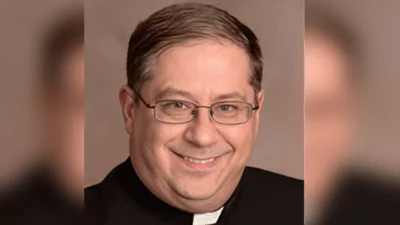Des Moines University issued the following announcement on August 30.
A health profession that helps individuals develop, adapt, recover, improve and maintain the skills to allow them to live life to the fullest has pushed Diana Feldhacker, O.T.D., out of her comfort zone more than once. It’s led her to serve patients across the lifespan and opened opportunities in academia.
Now her professional journey has brought her to DMU to help establish and chair a new Doctor of Occupational Therapy (O.T.D.) program in the College of Health Sciences.
“Creating a new program and being part of a graduate campus for health sciences is a really exciting position for me to be in,” she says. “I know DMU produces outstanding graduates, and I look forward to continuing this legacy with the addition of occupational therapy. DMU’s focus on interprofessional education and collaboration will allow O.T.D. students to learn from and with these distinguished health professions while fostering understanding of what occupational therapy does.”
Previously an assistant professor of occupational therapy at Creighton University, Dr. Feldhacker says her field focuses on helping people of all ages perform the activities they need and want to do – i.e., “occupations” – so they can live as fully and meaningfully as possible.
“We serve patients of all ages, from helping new parents with positioning and bonding with infants in the NICU all the way to promoting meaning and engagement for people in end-of-life care,” she says. “Occupational therapists get to spend time with their patients, which I like.”
Wallace Boeve, Ed.D., PA-C, dean of the College of Health Sciences, says the addition of the O.T.D. program “is an exciting opportunity for DMU to expand its graduate health programs in an area of patient care needs that is aligned with the mission and values of DMU’s interprofessional education expertise.”
“The O.T.D. program will draw upon the rich history of medical training and rehabilitation science programs which DMU has done so well as evidenced by its amazing faculty and quality alumni,” he adds.
Dr. Feldhacker, who is completing a Ph.D. in health science at the University of South Dakota, first observed the profession in action at age 8, when her grandfather participated in rehabilitation post-stroke. She earned her bachelor’s degree in health science and her O.T.D. at Creighton in 2012, practiced in a variety of settings and then joined the University of South Dakota as an assistant professor in 2016. She returned to Creighton in 2018 as assistant professor, earning several outstanding teaching awards. She also was coordinator of Creighton’s new O.T.D. pathway in Phoenix, which began enrolling students this year.
“That included getting the pathway accredited, making decisions about building needs and equipment purchases, hiring faculty and staff and marketing the program,” she says. “I learned a lot and am thankful for the experience, which will be invaluable in the successful launch of DMU’s new O.T.D. program.”
Dr. Feldhacker says the first step for the University’s new program will be acquiring candidacy status for accreditation through the Accreditation Council for Occupational Therapy Education (ACOTE). That process will involve demonstrating that DMU has all the resources needed to start and support the program, a curriculum that will ensure students meet the profession’s standards as well as established fieldwork training sites.
She anticipates DMU’s three-year O.T.D. program will have students enrolled to begin in fall 2023 and that its curriculum will entail eight semesters, with five semesters of didactic instruction followed up by two semesters of fieldwork and a final semester-long capstone experience and project. One of her goals for the program is that it will foster students’ clinical reasoning and reflective practice, building future occupational therapists who are lifelong learners, evidence-based practitioners and culturally sensitive leaders.
“Building cultural humility comes best in situations in which you’re immersed and uncomfortable, where you’re forced to self-reflect and gain a different point of view. It makes you better at building rapport and providing authentic and truly client-centered care,” she says.
“I hope the occupational therapy program can be an important part of DMU’s interprofessional efforts to foster cultural humility, promote diversity and support justice,” she adds.
Original source can be found here.



 Alerts Sign-up
Alerts Sign-up